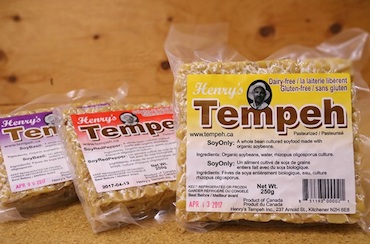
Ontario processor expands to meet demand for tempeh
Food in Canada
Food In Canada Business Operations Processing Products Research & Development Health & Wellness soy Soy 20/20Henry's Tempeh in Kitchener, Ont. has moved into new facilities and is expanding its processing capabilities to boost production

By Lilian Schaer for AgInnovation Ontario
Kitchener, Ont. – A local food company is expanding to meet growing demand for tempeh, a gut health-friendly soy food popular in healthy cuisine.
Henry’s Tempeh has just moved into new facilities in Kitchener and is expanding its processing capabilities to boost its production.
This fermented food product, a staple in Indonesian cuisine, is made from locally grown, certified-organic Ontario soybeans and is available in five flavours at more than 300 stores from Manitoba to Nova Scotia, as well as locally in Kitchener area shops and restaurants.
Not only is Henry’s Tempeh minimally processed, but it’s more convenient than other tempeh products because it is pasteurized and refrigerated, making it easier for consumers to use, says one of the company’s owners.
“Our tempeh offers a source of complete protein comparable to that of chicken or beef, and is ready to eat out of the package, making it very convenient,” explains Phil Diceanu.
“It also has a shelf life of up to four months and it’s very versatile and easy to use, whether you’re frying, baking, or crumbling it.”
“Our product speaks for itself when it comes to ease of use and its health benefits,” he believes, adding that Canadians are gradually becoming more aware of the potential presented by fermented food products, a category that also includes products like kimchee, miso and kefir.
Fermentation makes foods easier to digest, breaking down proteins into more basic amino acids that can be more readily absorbed by the human body.
Industry support
Henry’s Tempeh was originally established in 2002, but after working for the company as an employee upon his return from several years in Indonesia, Diceanu’s business partner Paul Sauder purchased the business when its founder retired four years ago. Diceanu and Jason Jurchuk bought in with Sauder this past year; both had also been employees of the business.
Soy 20/20, a Guelph-based organization that supports the development of new uses for Canadian soybeans, has been helping Henry’s Tempeh with sales and marketing activities, as well as facilitating an introduction to Bioenterprise, where the company was able to access some seed funding for their recent expansion.
“Tempeh production can be tricky with a lot of things to consider, so a big goal for us to achieve was doubling our production capacity,” says Diceanu, adding the Bioenterprise seed funding was invaluable to automation, increasing capacity, and supporting food safety.
Their next goal is to complete their Hazard Analysis Critical Control Point (HACCP) food safety processes certification, and develop a formal marketing plan that will include online promotion and presence at events and festivals.
And they hope to keep their innovation pipeline busy too with plans to bring forward new tempeh food products to market, such as tempeh strips as a salad topper or a crumbled product that could be a protein source for vegetarian pizzas.
“This is a good news story for the Canadian soybean industry,” says Soy 20/20’s Jeff Schmalz. “It’s truly a healthy product from a nutrition perspective and this represents a new and growing market opportunity for Canadian soybean growers to supply processors of specialty food products.”
Soy 20/20 is funded by Growing Forward 2, a federal-provincial-territorial initiative. The Bioenterprise Seed Funding program is funded by the Government of Canada through the Federal Economic Development Agency for Southern Ontario.
Photo source: AgInnovation Ontario & Henry’s Tempeh
Print this page